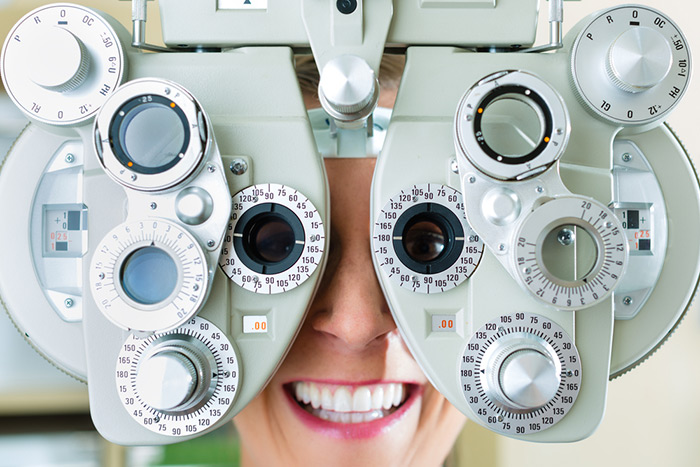![]() Take the Next Step. Request an Appointment or Consultation.
Take the Next Step. Request an Appointment or Consultation.
Before Your Visit
What to expect during your visit with us
When it comes to trusting the people who fix your eyes, you’d probably prefer medical expertise and advanced technology to genuine kindness. But our goal is to keep you from ever having to make that choice. We offer the best of both!
See what to expect and see why we are clearly different.
The Visionary Eye Doctor Experience
For every experience in life that we’ll always remember – experiences so wonderful and significant that we can’t forget them – there are thousands of nearly minor details that made it possible. As you journey through correcting your vision, we focus on those details and do our best to provide you with a comprehensive eye health experience.
Greetings
One common thread that unites all of us as people is our shared dislike of waiting rooms. Your time is precious, and we try our best to ensure your time here is minimal as needed. However, please keep in mind that for a complete eye exam, it can take up to two (2) hours, should your eyes need to be dilated and any other testing that may need to be completed to ensure the health of your eyes. Additionally, sometimes we do have emergencies with our patients that we will fit into our schedule, however again we do all we can to ensure your time is spent wisely.
When you arrive, you will be directed to our office kiosk to efficiently check some boxes and provide your information that will get your journey started. You can grab a cup of coffee or tea or a cool glass of water and kick back in a chair, but our goal again is to not have you wait long. Oh, and the people you’ll meet, well, they’re genuinely happy you’re here.
Your Eyes: Every Detail, No Surprises
To get the best information on your way to eyes that can see better, you will find the diagnostic and imaging technology from several different ophthalmology specialists’ offices – right here in this one place. There are too many 3D and laser scanners to list here (but they’re here).
What to Bring With You to Your Visit
Each patient’s story is different. Your particular visit or procedure may require that you come prepared with items different than that of another patient. However, in general, we ask that you bring the following when visit our office:
- Your driver’s license or photo ID
- Your current medical insurance card and your vision insurance card or information
- Your current pair(s) of eyeglasses, contacts
- Any medications (including non-prescription) you use regularly, as these may be contributing or hindering eye health
- Your questions, please bring any and all questions or concerns you may have.
We invite you to take the next step
Request a consultation or an appointment click here or please call us at 301.896.0890
Visionary Eye Doctors FAQs
Insurance FAQs
Do you take my insurance?
Please note: while we accept most insurance plans, some of our doctors participate only in certain plans. If the doctor you choose to see does not participate in your plan, you are welcome to see another doctor or receive care as a self-pay patient regardless of your insurance coverage. We encourage you to call our billing manager to learn about other means of financing your eye and vision care or call our benefits specialist to gain a clearer understanding of what benefits your insurer allows.
We do accept Medicare and most Medicaid plans for Maryland and DC.
Do I need a referral for an eye exam?
Depending on your insurance, a referral may be required. Please contact your insurance company for more information.
What insurance can I use for my visit?
Please see our Medical Insurance vs. Vision Insurance.
Why do I still owe a balance if my insurance company has paid Visionary Eye Doctors directly?
Although you may be paying a hefty monthly premium for your health insurance (or a percent of what your employer pays), your health plan most likely does not cover 100% of the cost of your healthcare. It most likely covers approximately 80% of the cost of your healthcare. Additional costs (or out-of-pocket expenses) that you may be responsible for may include an annual deductible, co-payments, and co-insurance.
What is a deductible?
A deductible fee is an amount you have agreed upon with your insurance company that you must pay out of pocket before your insurance pays for the remainder of your authorized services. If you have not met your deductible, we will submit the claim and discuss with you the amount of your deductible that is your responsibility to pay. The amount is paid directly to Visionary Eye Doctors and your insurance company will be notified of this amount when the our bill has been submitted, so they can update any deductible remaining or update that your deductible has been met.
What is Co-insurance?
Your share of the costs of a covered health care service is calculated as a percent (for example, 20%) of the allowed amount for the service. You pay co-insurance plus any deductibles you owe. For example, if the health insurance or plan’s allowed amount for an office visit is $100 and you’ve met your deductible, your co-insurance payment of 20% would be $20. The health insurance or plan pays the rest of the allowed amount. Please note if there is any co-insurance fee, we will discuss this with you prior to services being provided to you.
What is a co-payment?
A co-payment (or co-pay) is a fixed-dollar amount that you pay each time for certain services. Most commonly, you will be responsible for a co-pay each time you have a doctor’s visit and for each prescription medication you fill. For example, typical co-payments may be $20 for each primary care physician visit, $35 co-payment for a specialist visit. Co-pays are most often used in HMOs and for services you receive from a network provider in a PPO.
I don’t have insurance, can you help me?
Visionary Eye Doctors offers Care Credit which has many payment options, including plans with no finance charges that are available. Please call 301.896.0890 to be connected to our billing department during our normal business hours 8:00 am to 5:00 p.m., Monday through Friday, or you may send us an email. If it’s after hours, we will respond back to you the next business day.
Contact Lens FAQs
Why is the contact lens evaluation fee separate from the comprehensive eye exam fee?
Comprehensive eye exams include tests that determine general eye health and refractive status (i.e. eyeglass needs). Contact lenses are medical devices that may have certain health implications if not prescribed correctly. Your Doctor must invest additional time and expertise to determine which contact lenses are in a patient’s best vision and health interest and, as you might imagine, there are additional fees for this service. Note: Sometimes this requires additional follow-up visits as well.
Insurance companies view most contact lenses as elective vision correction and generally offer a discount towards the contact fitting fee. In rare occasions, insurance companies may consider contacts as medically necessary and cover a portion or all of a contact fitting, such as those for patients with conditions like keratoconus. Most insurance companies take the position that if your vision can be corrected with glasses, then contacts are not medically necessary and therefore are not covered as extensively as glasses and your annual eye exam.
Do I need to be evaluated every year for my contact lenses?
Contact lenses come in “contact” with the delicate surface of your eye and, over time, can change the status of the health of your eye. Contact lenses are also considered “Medical Devices” as they are directly placed on your eye; this means an evaluation needs to be done every year even if the prescription does not change. Most health conditions that contact lenses can be responsible for causing don’t result in obvious symptoms like pain or vision change – only your doctor can determine if contact lens wear continues to be safe with your most recent prescription. Most experienced doctors agree that one year is a suitable amount of time between checkups to ensure your eye health, given you are relatively symptom-free.
What’s the difference between a standard contact lens therapy and a specialized contact lens therapy?
Standard contact lens therapy involves correcting vision for one standard challenge such as nearsightedness or farsightedness.
Contact lens therapy that requires treating astigmatism, bifocal vision or other special conditions requires deeper knowledge and more time invested on your behalf. This level of therapy is deemed “premium” and, subsequently, results in a different fee level.
How much are contact lenses?
Each brand of contact lens has its own related price, but generally our prices are matched to what you might find anywhere. We also offer value-added services for patients who purchase their year’s supply from our office, such as discounts or glasses specials. We also provide services like easy box return and/or exchange, and free trial lenses when you’re running low (for patients who purchase their year’s supply from us).
Eyeglass and Optical FAQs
Why is my eyeglass prescription good for 2 years, but my contact lens prescription is only good for 1 year?
These expirations are determined by the State Department of Health and Mental Hygiene and are based on the recommendations of a panel of Doctors who make recommendations on medical device usage. While these are the recommendations of the State, a Doctor can set their own recommendations if they feel it is in the best interest of their patient’s health.
How much are glasses?
There is a broad range of costs for eyewear depending on the options you choose. The most basic eyewear with a simple frame and lens can be as low as $79, while a top-of-the line designer frame (such as Gucci) with high definition optics can cost several hundred dollars. We offer options for every budget, and some of these options are unavailable elsewhere. We respect your desire to discover your best value, and we invite you to discuss your budget with our opticians. We have years of experience maximizing insurance benefits and medical flexible spending, and will work within your budget. Ask about our second pair discounts as well!
Is there a refraction fee?
Yes, most medical and vision insurance plans do not pay for a refraction fee. There is an additional $67 refraction fee for glasses prescriptions.

